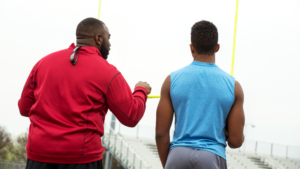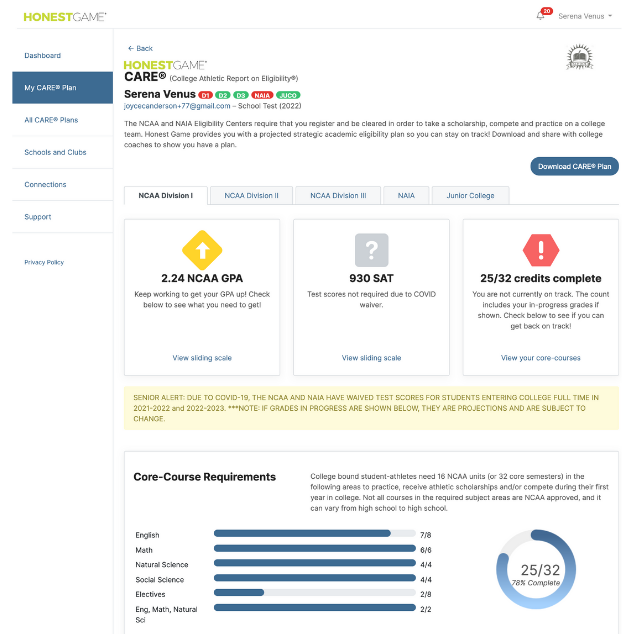How to Leverage Academics When Talking to College Coaches
Published on May 6, 2025

As a student-athlete you are constantly working hard to push your athletic ceiling and to be noticed for your skills, strength, speed and character. Just as you would send game highlights or a link to your Hudl account, you should be putting your best foot forward to highlight your academic achievements.
Academic eligibility is a large piece of the college recruiting process and is often the doorway to athletic success at the next level.
Know What a College Coach is Looking For
Just as a college coach evaluates a student-athlete’s playing ability, they will consider a candidate’s ability to meet the school’s admissions standards, their NCAA, NAIA or JUCO eligibility status and potential academic scholarship opportunities when reviewing recruits.
“What many don’t realize is that academic excellence can open doors that athletic ability alone cannot. Making the investment before one’s college search to be in good academic standing (and working hard to maintain that standing) is a process many overlook until it is too late.” – Stephanie Bernthal, Former NCAA Division I Field Hockey Head Coach
In addition to widening the pathway for the possibility of playing at the college level, an outstanding GPA and quality standardized test scores can be the difference-maker between you and another player. Coaches want to fill their rosters with athletes who will work hard. If you can prove you have discipline and dedication in the classroom, they may see you as the right candidate for a spot on their roster.
Often college coaches are able to advocate for their recruits in the admissions process and the weight can be significantly lifted off of the coach when a recruit has achieved high grades and test scores – easing the workload on the coaching staff.
Honest Game Insight: Sharing your academic standing early on in the recruiting process can give you an edge and if in good academic standing, may also open more college scholarship opportunities.
What is Academic Eligibility and Why Does It Matter to College Coaches?
Academic eligibility is the status that determines whether a student will be able to practice and compete at the collegiate level – and is determined using some combination of a student-athlete’s SAT/ACT test scores, high school coursework, GPA, and in some cases class rank.
For the NCAA, academic eligibility is determined using a combination of a student-athlete’s high school coursework and their GPA as calculated using what are called the “NCAA Core Courses“. These courses must be completed on a specific timeline and in specific subject areas.
The academic eligibility requirements are unique to each association and student-athletes must meet different requirements depending on which level the prospective school competes at.
To simplify the process of understanding your academic eligibility status, Honest Game CARE® (College Athletic Report on Eligibility) provides an individualized report with a student-athlete’s academic eligibility status and a clear outline of the test scores and grades that are needed to be eligible at each level for college sports. CARE® is downloadable and easy to share with prospective college coaches and recruiters.

If you’re not a full qualifier yet, don’t give up your dreams of playing at the next level! With CARE®, each student-athlete receives a simple, goal focused formula to outline what classes and grades are needed to be eligible with step-by-step recommendations to get you back on track.
What to Include in Your Recruiting Toolkit
Preparation is key! You never know when a prospective coach might come calling. Having your recruiting materials in order and knowing what to expect when speaking with coaches can lead to greater success in the end.
Earlier, Honest Game reviewed the types of questions you could ask a college coach and follow-up questions you might have to answer – below we’ve highlighted a list of materials prospective student-athletes should have readily available to share with college coaches and recruiters. This may include:
- Your Honest Game CARE® plan
- Hudl highlight film
- High school and club coach contact information
- Upcoming competition schedule (high school season, club season and future recruiting camps/showcases)
Best Time to Share with College Coaches
Are you heading into your high school season or scheduling your tournament schedule with your club team? While recruiting timelines vary amongst athletes and sports, being proactive and prepared is necessary for every college-bound student-athlete.
Need help assembling your recruiting toolkit? Honest Game Counselors are here to help take the guesswork out of academic eligibility and are available to provide one-on-one assistance to support student-athletes in navigating post-secondary opportunities athletically and academically. Schedule a time to meet virtually with our experts.

A former High School Athletic Director with more than 14 years of experience, Courtney has guided thousands of student-athletes through the NCAA and NAIA college eligibility and athletic recruiting process.



